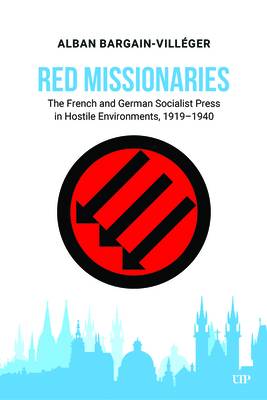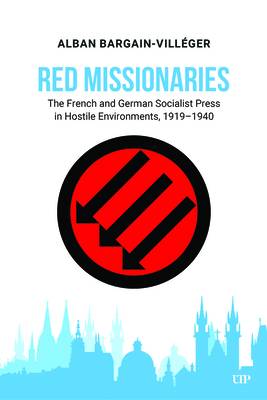
Bedankt voor het vertrouwen het afgelopen jaar! Om jou te bedanken bieden we GRATIS verzending (in België) aan op alles gedurende de hele maand januari.
- Afhalen na 1 uur in een winkel met voorraad
- In januari gratis thuislevering in België
- Ruim aanbod met 7 miljoen producten
Bedankt voor het vertrouwen het afgelopen jaar! Om jou te bedanken bieden we GRATIS verzending (in België) aan op alles gedurende de hele maand januari.
- Afhalen na 1 uur in een winkel met voorraad
- In januari gratis thuislevering in België
- Ruim aanbod met 7 miljoen producten
Zoeken
Red Missionaries
The French and German Socialist Press in Hostile Environments, 1919-1940
Alban Bargain-Villéger
€ 99,95
+ 199 punten
Omschrijving
Red Missionaries explores the communication strategies of French and German Socialist parties during the inter-war period (1920-1939).
With the help of eighteen newspapers - ten Bavarian and eight Breton - alongside a rich variety of both primary and secondary sources, this book examines how the Section française de l'Internationale ouvrière (SFIO) and the Sozialdemokratische Partei Deutschlands (SPD) navigated political messaging in two traditionally conservative regions. Focusing on electoral campaigns and May Day-related events between 1919 and 1939, the study challenges the prevailing view of these parties as inflexible and doctrinaire. Instead, it reveals a surprising adaptability and nuance in their approaches, questioning the notion that both parties inevitably became more bureaucratic and conservative during this period.
Through detailed analysis of press coverage and party activities, Red Missionaries uncovers unexpected similarities between the SFIO and SPD, suggesting that their strategies were more aligned than previously assumed. Ultimately, this book not only reconsiders established narratives but also deepens our understanding of socialist politics in inter-war Europe.
With the help of eighteen newspapers - ten Bavarian and eight Breton - alongside a rich variety of both primary and secondary sources, this book examines how the Section française de l'Internationale ouvrière (SFIO) and the Sozialdemokratische Partei Deutschlands (SPD) navigated political messaging in two traditionally conservative regions. Focusing on electoral campaigns and May Day-related events between 1919 and 1939, the study challenges the prevailing view of these parties as inflexible and doctrinaire. Instead, it reveals a surprising adaptability and nuance in their approaches, questioning the notion that both parties inevitably became more bureaucratic and conservative during this period.
Through detailed analysis of press coverage and party activities, Red Missionaries uncovers unexpected similarities between the SFIO and SPD, suggesting that their strategies were more aligned than previously assumed. Ultimately, this book not only reconsiders established narratives but also deepens our understanding of socialist politics in inter-war Europe.
Specificaties
Betrokkenen
- Auteur(s):
- Uitgeverij:
Inhoud
- Aantal bladzijden:
- 312
- Taal:
- Engels
- Reeks:
Eigenschappen
- Productcode (EAN):
- 9781049800493
- Verschijningsdatum:
- 7/04/2026
- Uitvoering:
- Hardcover
- Formaat:
- Genaaid
- Afmetingen:
- 152 mm x 229 mm
- Gewicht:
- 1 g

Alleen bij Standaard Boekhandel
+ 199 punten op je klantenkaart van Standaard Boekhandel
Beoordelingen
We publiceren alleen reviews die voldoen aan de voorwaarden voor reviews. Bekijk onze voorwaarden voor reviews.









